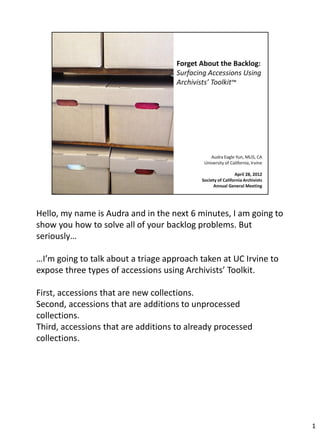
Forget About the Backlog: Surfacing Accessions Using Archivists' Toolkit
- 1. Hello, my name is Audra and in the next 6 minutes, I am going to show you how to solve all of your backlog problems. But seriously… …I’m going to talk about a triage approach taken at UC Irvine to expose three types of accessions using Archivists’ Toolkit. First, accessions that are new collections. Second, accessions that are additions to unprocessed collections. Third, accessions that are additions to already processed collections. 1
- 2. Christine Weideman’s 2006 article, “Accessioning as Processing,” introduced the MPLP philosophy earlier in the archival life cycle. In the article, Weideman describes Yale’s goal to perform minimal processing and description during the accessioning process, including the creation of a finding aid. The theme of the “exposing hidden collections” movement has been that: “some access to all is preferable to no access to some.” Here is an example of an unprocessed collection from Yale. As you can see, they have provided excellent information about the creator, a scope and content note that indicates the collection is unprocessed, as well as a box inventory. But what if the collection is completely unprocessed – what if you don’t have a box inventory? 2
- 3. In 2010, UCI initiated a project to create collection-level minimal DACS finding aids for every unprocessed collection in our backlog. Here is an example. You can see that there is no inventory for the collection and that the Access Note simply says, “This collection has not been processed.” The Yale or MPLP approach was useful in creating best practices for minimally processing collections at the point of accessioning. The collection-level minimal DACS project was quite valuable in exposing unprocessed existing collections. But I found very little published regarding accessioning in terms of providing access to unprocessed accessions. Not minimally processed or semi- processed, but simply unprocessed accessions. 3
- 4. First, exposing accessions that make up an entirely new collection. Every accession we create gets a finding aid and MARC record almost right away. In Archivists’ Toolkit, we create accession records fairly typically: abstract/description, box inventory, dates, extent, and an access restrictions note (as needed). 4
- 5. Once we connect this to an AT Resource Record, we beef up the finding aid a bit in order to make it a collection-level minimum DACS compliant finding aid. The basic idea is that we create an abstract from the accession description, copy it into the scope and content note, and copy the access note. 5
- 6. How does this look in the OAC? Exactly the same as our unprocessed collection records. There is no inventory, but we have dates, extent, subjects, an abstract, scope and contents note, as well as an access note. The access note usually asks researchers to contact us in advance to request access so that any restrictions review can take place. 6
- 7. Next, accessions that are additions to unprocessed collections. This accession is an addition to a larger, unprocessed collection of the Vice Chancellor of Student Affairs records for UCI. Same required info in this accession. 7
- 8. In the AT Resource Record for the linked collection, everything looks about the same – we update the extent and date information. But in addition to this… 8
- 9. …We add supplemental information to the Scope and Content Summary, describing the newest addition to the collection. I have summarized both the description and inventory notes in the original accession. I want to provide context and specific terminology regarding the new addition. 9
- 10. In OAC, the collection remains listed as unprocessed in the Access note, and my description of the scope and contents of the addition have been added to the collection as a whole. In this way, terms will be discoverable to researchers and will point to the collection. 10
- 11. Finally, accessions that are additions to processed collections. Again, the same fields are being completed. 11
- 12. When we connect this accession to a processed collection in AT, we update extent information and dates. But in order to retain the existing intellectual arrangement of the collection, we create a series-level component for the new accession. We create a descriptive title for the addition such as “Unprocessed correspondence” add dates and extent information, and then, at the component level, we add a scope and contents note and access note based on the accession. How does this look in the OAC? 12
- 13. The unprocessed records appear in the list of collection contents as a series-level component. All notes appear along with the title, including the scope and contents note and access note. Again, this exposes accession-specific terms and formats to the public. 13
- 14. At Yale, they also add new accessions to processed collections as a series-level component. The main difference is that at Yale, they have minimally processed the accession. Here is an example from Emory, which is nearly the same as what we are doing at UCI. They have created a series in this collection specifically for unprocessed additions, which includes a scope and content note and a box number range. 14
- 15. As we surface unprocessed collections and accessions, we seek ways to track user interest through web statistics and requests for on-site use. This information will help us create clearer processing priorities. “Forgetting the backlog” is an effort to consider access at the point of accessioning. MPLP is about less PROCESSING, but it also requires robust DESCRIPTION and contextualization. Our goal is to make descriptions of our collections available as quickly and as widely possible. Thank you! 15
- 16. 16